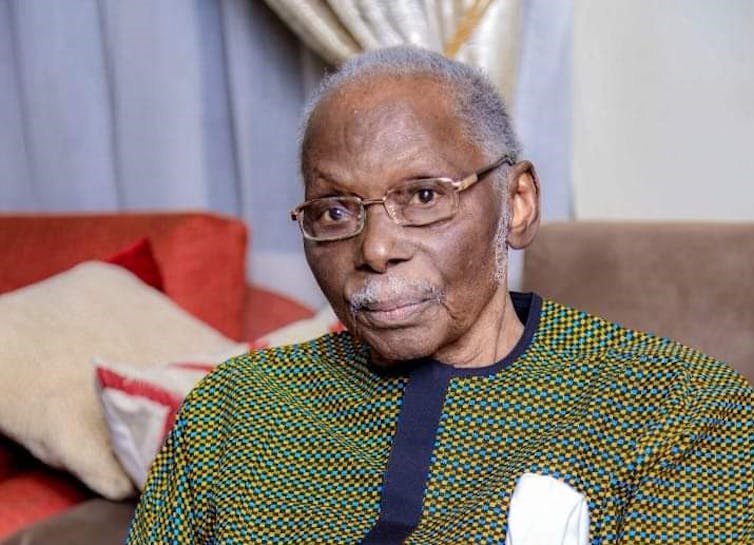Obaro Ikime, 1936-2023: Scholar of Nigerian and African Identity

“Death does not know the good ones” is a Yoruba phrase to describe the indiscriminate nature of death. If character and social values were considered in the roster of who was to die, I am sure that the Nigerian historian Obaro Ikime would have lived hundreds of years.
The grave, they say, holds the greatest aggregate of wealth.
Professor Ikime died on April 25, 2023, age 86.
He belonged to the second generation of Nigerian scholars trained at the University of Ibadan. His PhD thesis on indirect rule became part of the cumulative contributions of African historiography, known as the Ibadan School of History, famous for projecting the African perspective of history.
Uniquely, Ikime reflected social consciousness through his scholarship to give life to history and reduce abstractive tendencies.
He understood that scholarship should not be in a vacuum, and he was able to adopt it as an instrument of social communication and building of social consciousness of the past, present, and potential futures.
It would not make sense to think of Nigerian history without Ikime.
As a historian and scholar, I believe that Ikime made significant contributions to the discipline and the nation. He had a commitment to the role of history in building patriotism and citizenship. He called for the use of history in projecting institutions. His core idea was that the nation could not succeed without a sense of history. He was one of the first to introduce the teaching of inter-group relations to prevent another civil war in Nigeria.

Early life
Ikime was born in a village called Anibeze in Arohwa clan in the Isoko South Local Government Area of Delta State on December 30, 1936.
Like many of his generation, he was born into a rural family, what we used to call a “peasant background.” His father was a fisherman and his mother a farmer.
With the spread of western education, he was sent to school in an area which is now part of Delta State. He studied at Government College Ughelli between 1950 and 1956 before attending the University of Ibadan. He became one of the first in his area to have a Ph.D. and to become a professor.
Foresight and teaching
In his book The Fall of Nigeria, Ikime addressed the British conquest, emphasizing the factors that caused the collapse of precolonial sovereign nations.
The book was intended to remind society that some questions were left unanswered after independence and brought attention to the need to close marginalized gaps.
What made the message significant was the period in which the book was published, 1977, when the nation had more time to repair the margins gradually. Nigeria’s economy was strong then and the fault lines were not as deep as they are now.
Similarly, his foresight on risks to Nigeria’s democracy made him write The Nation State and Democracy: Essays in Political Thought and Practice in 1991.
This message, based in scholarship, was delivered at a time when Nigeria needed it most. The military government of Ibrahim Babangida was midwifing a transition program. Sadly, the transition culminated in the annulment of the June 12, 1993, presidential elections.
Ikime’s work drew attention to the complexities of society.
He taught us all – and is still teaching us – about the need to challenge what seem to be conventional narratives of society that are largely informed by vested interests.
National unity and history
Nigeria must appreciate Obaro Ikime’s fight to rediscover Nigerian and African identity. Aside from doing this through his publications, he took action to help keep alive the consciousness of national identity. He brought back the strength and virtue of precolonial Nigeria to people’s minds.
Ikime was a promoter of national unity. He understood the discomfort of not being able to identify properly with people of other ethnic groups. His legacy for promoting policies that recognize diversity and embrace ethnic differences cannot be forgotten.
He also stood firmly against the self-destructive policies of Nigerian government officials who had attempted to expunge history from the school curriculum.
Fearing that teaching history would revive the stories that led to the civil war of 1967 to 1970, government circles led discussions in the late 1970s to ban teaching history in schools. The emphasis on the sciences, technology and medicine undermined the humanities. Jobs became harder to find, and parents and students began to lose interest in history. It was eventually removed in the 2009-10 academic season.
Ikime warned against the marginalization of history as a discipline. Together with others, he criticized the government policy. It was not until the presidency of Muhammadu Buhari that the government brought back the teaching of history in schools in 2018.
Ikime was a fine individual whose magnanimity was beyond ordinary. He was always ready to help and promote civic responsibility. His patriotic tendencies and gentlemanly disposition had their roots in his upbringing by his parents, who set strict rules around virtue and integrity.


























































































